|
If you don't know the films of Aki Kaurismäki then
you could be in for a treat. The slight caution in my wording stems from the knowledge that his distinctive style certainly
doesn't work for everyone, although I've yet to meet someone
whose views I respect who doesn't delight in his singular
pairing of misery and deadpan hilarity. Maybe it's just
us. Certainly the audience for his films has remained closer
to cult than mainstream, even in his own country. In an
interview on Artificial Eye's DVD of his latest, Lights
in the Dusk, actress Maria Järvenhelmi
suggests that Finns themselves don't go and see his films
in large numbers because Kaurismäki gets a uncomfortably close to the truth about Finnish society and
attitudes. I can't personally vouch for this, but have
two Finnish friends who are jollier than anyone you'll encounter
in Kaurismäki's film world and who adore the director's
work, and they cheerfully testify to its accurate reflection of
both Finnish life and humour.

The
three films included here have been alternately referred
to, depending on the source, as The Underdog Trilogy and
The Workers Trilogy. Both titles are certainly appropriate, although
the first of these is a little imprecise, linking the titles
with a trait that is common to just about every lead character in
Kaurismäki's oeuvre. There's certainly the stamp of
the latter on the opening sequences of all three films,
which introduce us to the central character in their place
of work, focussing on the daily routine of rubbish collector
Nikander in Shadows in Paradise and on
the machinery that shapes and wraps the product for Iris's
inspection in The Match Factory Girl, while
the social commentary of Ariel is established
up front with Taisto helping to seal from the mine that he and his
colleagues have just been laid off from.
All
three films are clearly the work of the same director, sharing
his economically minimalist approach to storytelling, his
canny mix of traditional, blues and rock 'n' roll tunes
to both augment and counterpoint the mood of a scene, his
blend of observationally static shots with gentle dolly
work, the contribution of location and set dressing to the
mise-en-scène, and the way the gloom of the characters
does not downcast the film itself. The tone of the three
films may be similar, but the emphasis is different in each,
the deadpan comic exchanges in Shadows in Paradise
more poignantly undercut with the drama in Ariel,
while The Match Factory Girl paints its
comedy so dark that you be forgiven for missing it.
What
does unite the films and the characters is that they are
instantly and uniquely fascinating in a manner that defies
easy explanation. Certainly for someone who has grown increasingly
tired of being treated like a four-year-old by mainstream
cinema, which tends to loudly justify even the blatantly
obvious and handles emotional relationships as if following
strictly enforced stylistic guidelines, Kaurismäki's
imaginatively constructed and witty minimalism is a constant
delight. In common with Japanese actor/director
Kitano Takeshi, he can tell ten minutes of story with a single economical
shot or a perfectly timed edit, compressing a feature-length narrative into
little more than an hour. And there won't be a wasted moment
in it.
Shadows
in Paradise [Varjoja paratiisissa] was Kaurismäki's second feature, but even if the
only film of his you've seen is the recent Lights
in the Dusk, you'll instantly recognise this as
his work. The critical will find ammunition in this and
suggest that he has failed to progress or expand his horizons.
Of course you could also say that of Hitchcock and Ozu –
indeed it has been repeatedly claimed that the latter spent
his career essentially remaking the same film, but this is never
intended as a criticism. Ozu's films are often strikingly similar
to each other, but no-one else made films quite like Ozu,
and there's certainly no-one making them quite like Kaurismäki.
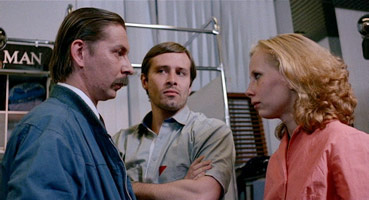
The
first half of this story's glum couple is garbage man
Nikander, whose regular co-worker tells him of his plans to start
his own refuse collection company – the bank is behind him,
he even has a location sorted, and he wants Nikander to come on board as
his foreman. It's a definite step up for Nikander and his
otherwise solitary and humdrum life, but wouldn't you know
it (this is a Kaurismäki film, after all), these best
laid plans die with their originator when he collapses on
the job with a heart attack. His dreams having been dashed, Nikander
recruits a new workmate, while two chance encounters land
him a date with unhappy supermarket cashier Ilona. It doesn't
go well – he takes her to a bingo hall – and she suggests
a parting of the ways. When she is laid off from her job,
however, she steals the firm's cash box and convinces
the bemused Nikander to drive her out of town.
Shadows
in Paradise is both an oddball love story and an
offbeat noir heist movie, complete with a revenge robbery,
a couple on the run and a moody femme fatale. Only here the robbery
nets little, the couple are don't go far, and although
definitely moody, there's nothing all that fatale about
our femme Ilona. Kaurismäki's ace in the hole here is actress
Kati Outinen, whose natural expression appears to be one
of misery bordering on tearful breakdown, a physical representation
of the director's trademark deadpan gloom. She's matched
all the way by Matti Pelonpää's deflated optimism
as Nikander, a man resigned to any fate that's handed out
to him but who still carries a small flame of hope for better
things. Little wonder that both actors became Kaurismäki regulars – Outinen was to appear in a further
nine films for the director (her role in the recent Lights
in the Dusk was effectively a cameo, but it still
counts), while Pelonpää was to feature in another
eight, plus two for the director's brother Mika.
Kaurismäki's distinctive style is on every frame of
the film, including his straight-faced humour, often in
stripped-down, functional exchanges that in mainstream western
movies would be emotional flashpoints. My favourite comes
when Nikander's co-worker outlines his plans for the new
company: "I've got a slogan already," he tells
Nikander with as much enthusiasm as he is prepared to muster.
"'Reliable garbage disposal since 1986'." "But
that's now," Nikander points out, which prompts the response,
"That's why it catches the eye."
Kaurismäki's
fifth feature is, despite some delightfully deadpan comedy
exchanges, one of his bleaker films, a downbeat drama of
misfortune built on a foundation of social commentary,
particularly regarding the changing employment prospects
in Finland in the late 1980s. This is signalled from the
opening scene, when a mine closure scatters the redundant
workforce to search for employment wherever they can find it. One of them,
Taisto, is given a Cadillac convertible by a colleague,
and after withdrawing his life savings, he too joins the work-hunt
exodus. This being a Kaurismäki film we don't expect
things to go that well, and it's no real surprise when Taisto
is knocked unconscious and robbed of his cash at the first
place he stops.
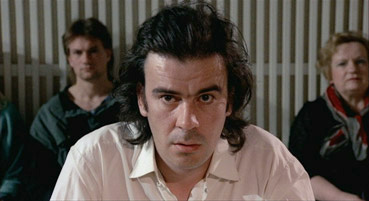
When
Taisto reaches the city he joins other desperate hopefuls
for a day's work at the docks, which pays enough for a bed
at the local mission hostel. A chance encounter hooks him
up with single mother Irmeli, who has to work long hours
in three different jobs to pay the bills. Taisto's own search
for regular work proves fruitless, and when he loses his hostel
bed he is forced to sell his car, his only
possession of worth. Chance again plays a hand when he spots
one of the men who robbed him – he avoids the man's knife,
but his attempt to retrieve his stolen money is interrupted
when he is overpowered and arrested by police, who have
mistaken him for the mugger. Prosecuted for the crime, he
is sent to jail for two years.
Even by Kaurismäki standards, Taisto is a bad luck
magnet, his run of misfortune almost as grim as that which
befalls Lukas Moodysson's Lilja in Lilja 4 Ever.
It's thankfully less punishing for the audience, due in
part to Taisto's uncomplaining acceptance of his fate (a typical
Kaurismäki trait), though the stone-faced deadpan humour
of his developing relationship with Irmeli counts for a
lot. Arriving at her flat at the end of the first date,
their unsmiling exchange is priceless:
| Irmeli: |
Thanks
for the evening. My first in a convertible. |
| Taisto: |
The
roof doesn't work. |
| Irmeli: |
I
know. It's dark. Want to come up? |
| Taisto: |
If
it's not too much trouble. |
| Irmeli: |
I've
only got coffee. |
| Taisto: |
Coffee's
fine. |
| Irmeli: |
I'm
divorced. |
| Taisto: |
Don't
let it get you down. |
| Irmeli: |
I've
got a kid, too. |
| Taisto: |
Even
better. We save time raising a family. |
| Irmeli: |
You
always this self-confident? |
| Taisto: |
This
is the first time. |
Taisto's
jail time has its own pleasures when his cell mate Mikkonen
turns out to be none other than Kaurismäki favourite
Matti Pellonpää, the friendship that develops
between the two giving the second half its structure and
the finale part of its emotional sting. The characters drive
the plot and there are no pauses for portraits of Finnish
prison life – others briefly enter the story only to move
Taisto, Mikkonen and Irmeli towards the final act.
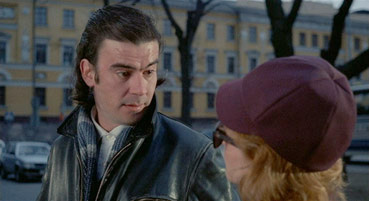
Despite
boasting a level a humour you'll not find in The
Match Factory Girl, Ariel is definitely
the most emotionally affecting of the Underdog/Worker Trilogy.
There's an overriding reality here that ensures the mechanics
of fate that keep this oddly likeable family unit from coming
together really do hit home. As with The Match Factory
Girl, it's the self-interest of others that does
the most harm, but here it is balanced by Irmeli and Mikkonen's
unwavering loyalty and Taisto's determination to do right
by both. The destructive wild card is the system itself,
indifferent to the truth or the fate of those who fall victim
to its failings. It leads to an ending that is at the same
time both hopeful and sad (and set beguilingly to a Finnish
rendition of Somewhere Over the Rainbow), a final
comment by Kaurismäki on his own society, and the point
you'll have to reach to discover the significance of the
title.
I'm
not going to sit on the fence here – as far as I'm concerned, The Match Factory
Girl [Tulitikkutehtaan tyttö],
Aki Kaurismäki's sixth theatrical feature, is a minimalist
gem of a film, a simple story of a dour young woman and
the action she eventually takes to balance her reckoning
with her own unfortunate life and the self-centred behaviour of others. Fascinating in the way Kaurismäki's films
and characters just seem to be, it's in the final fifteen
minutes that it hits its home run, a consolidating and darkly
satisfying story climax on which an entire essay could be
written, but which I cannot discuss here without ruining
it's delicious sting for first-timers. Any reviewer who
does so should be hunted out and heartily slapped for their
insensitivity.
Kati
Outinen again lends her extraordinary facial unhappiness
to the role of Iris, the match factory girl of the title.
A silent and efficient worker, she hands most of her wages
over to her equally cheerless mother and stepfather, whom
she lives with and keeps house for. Her search for companionship
is not going well, but a change of image attracts the attentions
of Aame, whom she spends the night with. Hopes of a developing
romance are soon dashed by Aame's indifference to her attentions
and annoyance at her persistence, but the discovery that
she is pregnant proves a turning point for her and her relationship
with those around her.
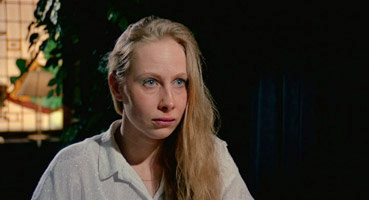
Kaurismäki's
specific brand of minimalism is extended here to a pared-to-the-bone
approach to dialogue, which very effectively emphasises
Iris's isolation and loneliness. We're 23 minutes in before
she speaks to anyone, while her fractured relationship with
her parents is highlighted by the first on-screen word spoken
to her by her stepfather, who slaps her face and calls her
a whore after she buys a new dress with wage money that is usually
handed to them.
This
non-verbal approach does produce one of the few light moments,
when Aame agrees to take Iris out and finds himself in the
seat-grindingly uncomfortable company of her parents while
she goes off to get ready for their date. It's a rare chance to smile
in an otherwise downbeat but consistently involving and
touching portrait of life suffocated by circumstance and
punished by the self-interest of others. It's hard to imagine
Iris played by anyone but Outinen, the brief moments when
a smile breaks her otherwise unbroken expression of gloom
betraying the hope that still flickers behind her grim façade.
It's
in the final scenes, those ones I prmised not talk about in detail,
that this galvanises her into action. It may not be the
romantic idyll she dreams of, but in the heartless world
in which she finds herself, it can't help but seem both
logical and perversely positive. It's here that you'll find
the deadpan humour that is largely suppressed in the build-up,
though rarely if ever in Kaurismäki's work will you
find it painted this black.
A
barrel of laughs it may not be, but The Match Factory
Girl tells its story with captivating cinematic
economy and an affection for its forlorn central character
that binds us to her from her first appearance. It's a bond
not just of sympathy but empathy, a recognition of darker
moments in our own lives and the cruelty we may have endured,
however brief or unintended, from those we regard as close
to us.
Of
the three films in this first set, the only one I have seen
on DVD before is The Match Factory Girl,
a Finnish disc whose transfer quality I was impressed with.
It would appear that Artificial Eye have sourced their disc
from the same original, as the anamorphic 1.85:1 picture
here is a dead ringer for the one on the Finnish DVD, and
that's fine by me. The other two films are similarly well
presented – the colour has an occasional and probably intentional
pastel bias, while contrast and black levels are bang on.
Film grain is sometimes visible and the occasional bit of
dust remains, but the level of detail is often first rate.
There is some slight flickering in a couple of scenes and
digital purists may be a bit miffed to see reel change markers
still present, but otherwise I have no complaints.
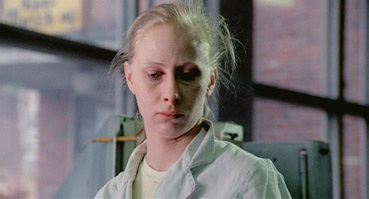
All
three films have Dolby stereo 2.0 tracks and they are some
of the best I've heard in a long while, vividly clear mixes
with strikingly full sound and tonal range. Frontal separation
is precise and well used.
None.
A bit of a shame, as a bit of background on each of the
films would have been nice, ideally from Kaurismäki
himself, but as far as I remember the Finnish discs were
also film-only affairs.
A
pity about the lack of extra features, but it really doesn't
matter. You still get three terrific films from one of world
cinema's most distinctive talents, all boasting fine transfers
and soundtracks. The first of four such collections from
Artificial Eye, collectively they should represent a long
overdue and most welcome treat. Warmly recommended.
|